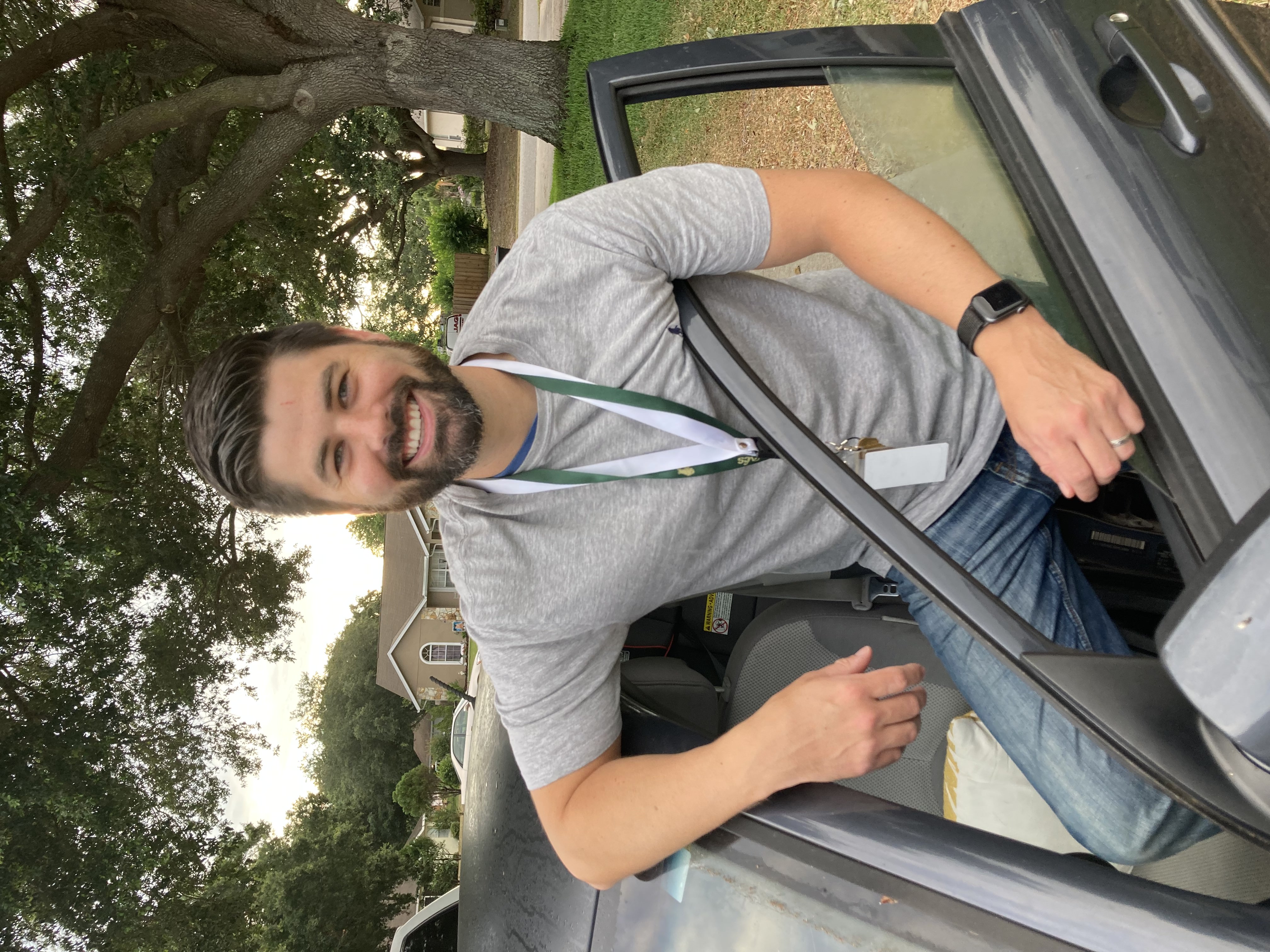A Man Born Blind
One of my aims for this blog is to provide encouragement from God’s Word that demonstrates great purpose behind difficult circumstances. But I can only offer that which I need myself. I’ve needed God’s Word over and over again to encourage me when the difficulties of autism begin to discourage me. I wish I could say that I live in a constant state of encouragement, but the truth is, discouragement likes to rear its ugly head again and again. Thankfully, God’s Word is an ocean of encouragement.
What I love about Christ’s earthly ministry is that He aims to demonstrate spiritual truths through the lowliest people in society. The hopeless and the discouraged. He came to seek and to save the lost (Luke 19:10). I am captivated particularly with the story in John 9 where Jesus heals a blind man from birth.
Jesus explains in John 8 that he is the light of the world saying, “He who follows Me shall not walk in darkness, but have the light of life (John 8:12).” Following this proclamation, we see the spiritual darkness exhibited by the Pharisees who attempt to stone Jesus at His claim to be God.
That’s a bit of context leading into John 9.
After escaping death and leaving the temple, John 9 begins by saying, “As Jesus passed by, He saw a man who was blind from birth. And His disciples asked him, saying, “Rabbi, who sinned, this man or his parents, that he was born blind (John 9:1-2)?”
It’s worth noting that there isn’t any indication of a large time gap between Jesus’s escape and seeing the blind man. It could have occurred on the same day or even the same hour. The point is, there is clear continuity between chapters 8 and 9. Jesus is the Light of the World. And what better way to immediately demonstrate that spiritual reality than healing a person born into physical darkness?
Here we get to see the beauty and the glory of God’s plans and purposes at work in a person born with a disability.
A Well of Encouragement
Jesus saw him. A young blind man begging in the streets. That was his life. Born with a disability, he was destined for a beggar’s life. A life as a social outcast. A life with seemingly little purpose or meaning. A life of darkness. I imagine thousands passed by this man in the street without any attention paid to him. But Jesus saw him for a purpose.
Imagine, to never see but to be seen by the Savior of the world. The Light of the World.
I have to think that when Jesus saw the man that he looked at him long enough for His disciples to begin wondering why. In their minds, this was a pitiful man who must have sinned horribly to warrant his condition. Or, his parents had. Why else would this man be born blind? And why was their Rabbi taking note of him? A sinful blind man. Aren’t there more useful people out there who can be used for kingdom work?
How true is it that we, like the disciples, forget the grace that brought us out of our own darkness.
Interestingly, the disciples did not ask “if” he or the parents had sinned, but “who” sinned. It was assumed that sin was the cause of the man’s blindness and no other explanation was possible. Jesus crushed those assumptions and showed His disciples in a powerful way that His ways are not their ways.
Jesus replied to them, “Neither this man or his parents sinned, but this happened so that the works of God might be displayed in him (John 9:3).”
This verse is a deep well of encouragement for special needs parents. We should draw from it whenever we feel discouraged.
Why?
Because I imagine every parent of a child with autism has wondered, at one time or another, what they did to cause an autism diagnosis. Am I being punished for a sin I committed? Did I make a wrong choice along the way? What could I have done differently? It’s not supposed to be this way.
We are all indeed sinners, but do not assume that sins or past mistakes are the cause of your child’s autism or other disability. That is clear from this encounter. God is sovereign and He had a plan for your child before the world was ever created. Even if you had made a decision that in some way contributed to your child’s autism or other disability, is God not gracious? Can God not take a difficult situation and redeem it for His purposes? I think so!
Like the disciples, we all tend to ask God the wrong questions. Perhaps, instead of questions of self-condemnation, we can ask God how he can use disability to advance His kingdom, how He can sanctify us in the family He gave us, or how we can help others in a similar situation.
If we make these our aim, we may discover that the disability confronting us each day is one of God’s greatest measures of grace in our lives.
A Light of Grace in My Life
God has patiently been working in me through the lives of my kids. Katie and I have to help Ellie with many of the mundane things most 5-year-olds can do independently. It’s exhausting at times. I still lose patience and fail constantly (more about that in my post “Learning Patience is Rough!).”
But because of Ellie, I have a greater sense of my complete and utter dependence on God. I need Him more than she needs me. He has used the difficulties of autism to draw me back to His Word over and over again to discover what it’s like to lie down in green pastures and have my soul restored, as David wrote (Psalm 23). I’ve also learned to slow down and delight in the little things that can be easily overlooked – a new word or phrase spoken, a genuine interaction with a sibling, or her ability to know and sing “Jesus Loves Me.”
It’s true, there are many experiences that we may miss out on, but the positives in the experiences we do have are magnified.
And when Jesus talks about child-like faith and the kingdom of God belonging to such (Matthew 18:3), Jack is my clear picture of that truth. We as adults like to think we’ve reached a maturity in our faith that our children should emulate. While I may be able to comprehend theological concepts better than Jack and I hope he learns from me, I sometimes lose the child-like wonder God desires in His children. Jack humbles me in that area.
I still continue to ask the wrong questions, but God is at work. His purposes are beyond our comprehension.
Why Autism, Lord?
Back to the blind man in the story real quick. Jesus indeed healed him of his physical blindness. But even more important than that, He healed him from spiritual darkness and made him spiritually alive. As a result, the man believed in Jesus (John 9:38).
In contrast, the Pharisees believed they were enlightened because they followed the Mosaic law, yet they were spiritually blind. Jesus used this man to demonstrate that He came to this earth so the blind would see and those who see would become blind (v. 39).
If only he knew how big an impact his story would have on the rest of humanity.
A blind man from birth. A man hopeless, discouraged, and in darkness was used as a magnificent tool of God’s grace to help point others to the Light of the World, Jesus Christ.
When I ask, “Why autism, Lord?” He answers, “So that the works of God might be displayed in her/him.” The lowliest become the greatest object of God’s affection, not because of anything they have done, but because of His goodness. The foolish things of the world are used to shame the wise (1 Corinthians 1:27).
It grips my heart to think about what life would have been like for Ellie in Jesus’s time. She would have been passed by, given an odd look, and left to fend for herself. But Jesus never just passes by. He sees your child and He sees you. He may or may not physically heal your child as He did the blind man, but he may just use your trials to humble you, wreck your self-sufficiency, and heal you of your pride.
All of which are an ongoing work of His grace. A light of grace in the darkness.
I am the light of the world. Whoever follows me will not walk in darkness, but will have the light of life.
John 8:12








Melinda Cosentino
January 31, 2022 2:52 amHi John, we are enjoying your blog posts. Praying for the Lord to open doors of opportunity. Praying for you and your beautiful family. : ) Uncle Joe and Aunt Mindy
Angel Navejas
April 25, 2022 3:22 pmVery nice post. I definitely appreciate this site. Continue the good work!
91club
April 25, 2024 2:22 amI’m extremely impressed with your writing skills as well as with the layout on your weblog. Is this a paid theme or did you customize it yourself? Either way keep up the excellent quality writing, it’s rare to see a nice blog like this one these days.|